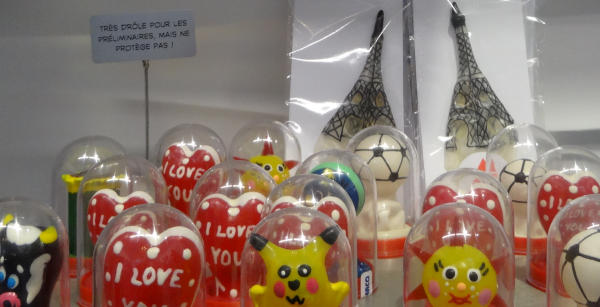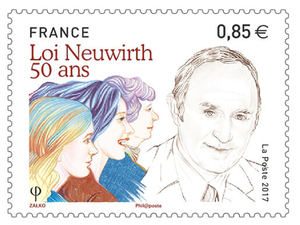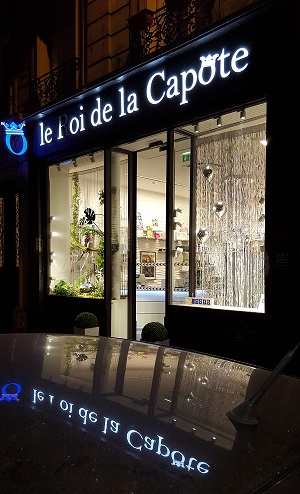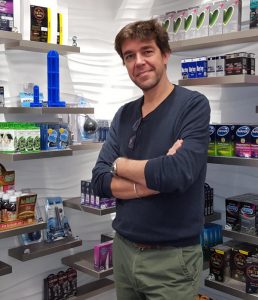
Every year brings a new crop of American and British books explaining how to connect with one’s inner Parisienne, that model of slender and sexy sophistication. By now we all know how she dresses, what she eats, where she strolls, how she flirts and how she raises her children. But the books fail to follow our perfect pouty-lipped Parisienne to her doctor’s office where she discusses birth control and STDs or to the boutique in the 11th arrondissement where she shops for condoms. Yet 83% of French women of childbearing age use contraception, which is far more than the percentage that stay thin by drinking wine, smoking slim cigarettes and judiciously selecting exquisite pastries.
No need for discretion. France recently marked the 50th anniversary of its law authorizing the sale and use of contraceptives. Adopted in December 1967, it is known as the Neuwirth Law, after Member of Parliament Lucien Neuwirth. Neuwirth had fought for nearly a decade beforehand for the right to contraceptive use, supporting and supported by the Family Planning Movement.
That movement was created in 1956 under the name La Maternité Heureuse (Happy Motherhood). In 1960 it was renamed Mouvement Français pour Le Planning Familial (French Movement for Family Planning), or Le Planning Familial (Family Planning) for short. Family Planning and its motto Liberté, Egalité, Sexualité gained visibility and strength as the 1960s progressed. Liberté, Egalité, Sexualité, now there’s a good reason for all of us to get in touch with our inner Parisienne.
 The postal service commemorated the law’s 50th anniversary with a stamp dedicated to Neuwirth and showing three ages of women. The image of the three women is a stylized version of a prominent Family Planning poster of 1978 which bore the words “un enfant… si je veux… quand je veux” (a child… if I want… when I want.).
The postal service commemorated the law’s 50th anniversary with a stamp dedicated to Neuwirth and showing three ages of women. The image of the three women is a stylized version of a prominent Family Planning poster of 1978 which bore the words “un enfant… si je veux… quand je veux” (a child… if I want… when I want.).
The Neuwirth Law primarily aimed to overturn the Law of 1920 that prohibited any action, advertisement or propaganda in favor of abortion or contraception. That post-war law had been passed on the premise that, with some 1.4 million French war dead, laws preventing further depopulation trumped a woman’s or a couple’s right to choose. So while the pill, that great liberating force in the sexual revolution, had been a hit in the United States since the early 1960s, it couldn’t play that role in France as long as the earlier law stood guard.
(As an interesting contrast on the timeline of nations, 1920 is the year that women obtained the right to vote in the U.S.; it took another world war for women in France to be granted that right, first exercised during the elections of 1945. Meanwhile, Planned Parenthood remains under attack in the U.S..)
Abortion was legalized by the Veil Law of January 1975, put forth by then-health minister Simone Veil. Since 2001 abortion has been allowed until 12 weeks of pregnancy and parental authorization for minors is no longer required.
The pill remains queen despite waning influence
In France, according to a research paper published (in English) to coincide with the 50th anniversary, 83% of women of childbearing age use contraception. A 2014 U.S. Center for Disease Control (CDC) brief indicates that 62% of American women ages 15 to 44 use contraception.
Whereas, according to the French paper, 43% percent of contraception in United States involves sterilization (tubular occlusion for women, vasectomy for men), with about third being male sterilization, only 5% of contraception in France involves sterilization, with the percentage of male sterilization being negligible. The CDC brief gives different figures for the U.S. but nevertheless finds female sterilization (15.5%) nearly on par with use of the pill (16% in terms of percentage). Vasectomy (male sterilization) is not covered in that brief but where elsewhere reported the number performed in the U.S. is significantly higher than in France.
The pill, by contrast, is by far the contraceptive method of choice in France as it represents more than 40% of all contraceptive method use. That, however, represents about a 20% decrease over the past decade, with the initial decline largely attributed to the possible risks associated with recent generations of the pill.
The French health system supports contraception: implants, IUDs, diaphragms and some contraceptive pills are reimbursable (65%) through the national system, as is access to the morning-after pill. Those same contraceptive methods and the corresponding medical consultation (doctor’s office, school infirmary) are free to minors of at least 15, without need for parental notification.

In France, male condom use (often combined with female oral contraception) has increased since the HIV epidemic in the 1980s, representing about 15%. Condoms are non-reimbursable but are rather inexpensive.
Women who have left their oral contraceptive at home when traveling abroad to France would typically need to see a doctor for a prescription. A pharmacist, however, might help, particularly with the morning-after pill, called la pilule du lendemain or la contraception d’urgence in French
If you or your partner has packed FDA-approved condoms, rest assured that they will make it through customs even if they don’t bear the EU stamp of approval. But why ruin the fun of shopping overseas.
The Condom King, Le Roi de la Capote
The French word for a condom is un preservatif or, colloquially, une capote. (It used to be more commonly called une capote anglaise or English bonnet/hood/overcoat, as the English, upholding their side of tit-for-tat terminology, would refer to a condom as a French letter or French tickler for the fanciful kind).
The word condom will likely be understood in Paris, but ask for a condom in southwest France and you risk being given directions to the charming town of the same name, in Armagnac country, midway between Bordeaux and Toulouse. Condom the town would rather that travelers associate it with the architectural appeal of its cathedral and cloister and with the culinary and cultural appeal of Gascony rather than with French letters, though many an English-speaking traveler has undoubted entered the town on the snick of its name alone.

The town aside, France’s premier destination for all things condom is in Paris and online at Le Roi de la Capote, the Condom King, a shop created and owned by Marc Pointel. Pointel opened Le Roi de la Capote as an online shop in 2005 and eight years later opened a brick-and-mortar, rather a latex-and-gel shop in Paris’s 11th arrondissement. Seventy percent of its sales are online, while it’s the 30% of in-store sales that Pointel sees as a sign of its success. The store is located at 106 boulevard Richard Lenoir in the 11th arrondissement.
This is not a sex shop. It is a bright, open, come-one-come-all parapharmacie, a type of shop that sells health products but not medication.
Classic mass-market condoms are no more expensive here than in any grocery store in Paris (the other place to purchase them, along with pharmacies and parapharmacies), perhaps even less as is the case if you wish to stock up on a 300-pack at 0.10€ per condom for the traveling optimist or that special New Year’s party. (Note: condoms typically carry a 5-year expiration date.) Single condoms are sold for as little as 0.20€. The most expensive condoms here come out to about 1.50€ each. A small price to pay, says Pointel, for the serenity of knowing that you and your partner are protected, not planning on conceiving just then, and having great pleasure.
The French nevertheless complain about condom prices, Pointel notes, because they don’t like to pay for anything medical related.
The Condom King is the exclusive retailer in France of My One Perfect Fit (formerly They Fit) condoms, an American brand that comes in 56 sizes. A paper ruler is available to properly measure oneself or one’s partner (at home). Various types of lubricants are also available as are hygiene products and massage oils. You’ll also find some a few playful objects, including cheering but non-protective condoms (seen at top of article), such as an Eiffel Tower condom, perhaps something to offer one’s lover as a way of saying “we’ll always have Paris… without STDs.” See the website the list of products sold by the King.

While the items sold at the Condom King may lead to good fun between the sheets, Pointel recognizes their role—and his own—in helping to promote sexual health. Furthermore, the condom, since it involves at least two people, has a social role, even if that role presents itself intimately between the two. “The condom,” he says, “is the tree that hides the forest [of many public health issues].”
Erectile and other sexual problems and concerns have many roots, he says, and the best place to start is by having someone to speak with about it. “I manage to destress those who are stressed when they enter,” he says. Indeed, Pointel has the assured sense of humor to help put anxious clients at ease and the proper discretion to allow those entering the king’s domain to shop unassisted if they prefer.
He tells of an athlete in his twenties who said that condoms keep him from having an erection and a 30-year-old woman (20% of his clients are women) who said that she’d never had an organism. “It takes nerve to say that,” he says, “and once said it should be discussed.”
Even for online sales, Pointel says, many people will call before ordering, and their calls often fall into a “grey zone” between requests for purchasing advice, as other merchants might receive, and requests for information about sexual health. While he cannot by law physically examine or diagnose clients, he recognizes that during such calls or in-store conversation, the individual is seeking a form of consultation, speaking of matters that he or she may not yet have broached with a medical professional or a therapist. He fully accepts his role in listening to the individual’s symptoms and complaints and in suggesting, nudging or guiding the person, if possible, to speak with a medical or therapy specialist, or simply to correct any sexual myths or misconceptions.

(Pointel isn’t always at the front of the shop since his office and storage facility for online orders are in the back. While his assistants are quite capable, those looking for advice shouldn’t hesitate to ask if he is available. He’s fluent in English.)
Recognizing his unique position on the frontline of health issues, Pointel, who had previously studied sexology, recently completed further studies in sexual health. In June 2017 he obtained a University Degree (D.U. in French—a type of master’s degree) in the matter from the Paris-Diderot Medical School. His thesis was entitled “How and within what limits does a related and specialized parapharmacy participate in the promotion of sexual health? Practical situations and ethical questions.”
Unfortunately, he says, “the Anglo-Saxon puritanism of the major players of the Internet (GAFAM: Google, Apple, Facebook, Amazon and Microsoft)” consider Le Roi de la Capote’s website as an “adult site” or an “adults only site,” meaning that it may assimilated with pornography.
“We’re considered to be selling ‘adult products’ whereas the condom is a key element of public health,” he says. “It’s also a tool that should be associated with pleasure. We need to ‘re-eroticize’ the condom. Thinking only in terms of protection can cause stress, and we don’t make love when we’re stressed.”
But the Condom King can only do so much for the sex lives of our perfect pouty-lipped Parisienne. La Parisienne has a lot going for her, says Pointel, “but the mouth is the first sex organ that one encounters, and she doesn’t smile enough.”
Le Roi de la Capote, 106 boulevard Richard Lenoir, 11th arr. Metro Oberkampf or Parmentier. Tel. 01 42 38 60 40. Closed Sunday.
© 2018, Gary Lee Kraut

